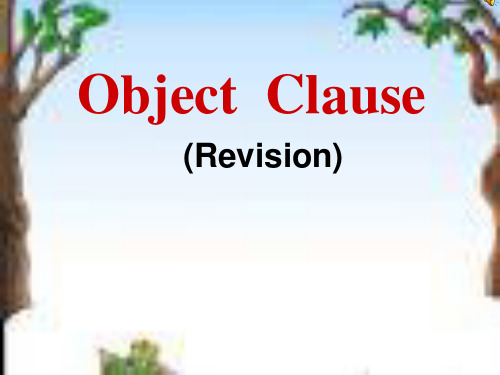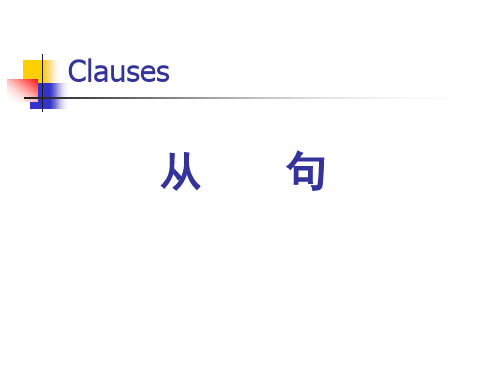object clause
- 格式:ppt
- 大小:201.50 KB
- 文档页数:8

object clause英语定义【Object Clause 英语定义】**开场白**嘿,朋友!你在学习英语的过程中,有没有被各种语法术语搞得晕头转向?今天咱们就来聊聊一个重要的语法点——Object Clause(宾语从句)。
比如说,当你想要表达“我不知道他在哪里”,这里面就藏着宾语从句的身影。
那宾语从句到底是啥呢?让我们一起来揭开它神秘的面纱!**什么是 Object Clause?**其实啊,宾语从句就是在一个句子中充当宾语的从句。
打个比方,“I think that he is right.”在这个句子中,“that he is right”就是宾语从句,它整体充当了“think”这个动作的对象。
很多人容易误解宾语从句就是一个很长很复杂的句子,其实不是这样的。
它可以很简单,像“She knows what I like.” 这里的“what I like”就是宾语从句。
**关键点解析**3.1 核心特征或要素宾语从句有几个关键要素。
首先,它得有引导词,像 that、if/whether、what、who 等等。
比如,“I wonder if he will come.” 这里的“if”就是引导词。
其次,宾语从句要用陈述句语序。
像“Can you tell me where the library is?” 不能说成“Can you tell me where is the library?” 最后,宾语从句的时态要根据主句的时态来变化。
比如主句是一般现在时,宾语从句可以根据实际情况用各种时态;但如果主句是过去时,宾语从句通常也要用相应的过去时态。
3.2 容易混淆的概念宾语从句容易和定语从句混淆。
定语从句是用来修饰先行词的,而宾语从句是充当宾语的。
举个例子,“The boo k that I bought yesterday is very interesting.” 这是定语从句,“that I bought yesterday”修饰“book”。





宾语从句(Object clause)1). 用作宾语的从句叫做宾语从句。
引导宾语从句的关联词与引导主语从句的关联词大都一样。
如:- I understand that he is well-qualified, but I feel that he needs more experience. (关联词是从属连词that)- I doubt whether he will succeed. (关联词是从属连词whether)- I don’t know whom you want. (关联词是疑问代词whom)- I wonder when he’ll come. (关联词是疑问副词when)2). 下面句中的that从句一般不可省去that:- They told us once again that the situation was serious.or: They told us that once again the situation was serious.(两句中的that都不可省,否则会产生歧义)- He said (that) he couldn’t tell you right away and that you wouldn’t understand. (said之后可省去that,但第二个that不可省去)- That he ever said such a thing I simply don’t believe. (that从句置于句首时,that不可省去)- We decided, in view of his special circumstances, that we would admit him for a probationary period. (谓语动词decided与that从句之间有插入的词语,故that不可省去)3). 下面句子中必须用whether,不可用if(是否):- Whether she likes the present is not clear to me. (主语从句置于句首时,须用whether,不用if,但可以说It is not clear to me if she likes the present.)- My main problem right now is whether I should ask for another loan. (引导表语从句一般应用whether,不用if)- Answer my question whether you are coming. (同位语从句须用whether,一般不用if)- He didn’t say whether or not he’ll be staying here. (whether可与or not 直接相连,if则不可,但可以说He didn’t say if he’ll be staying here or not.)4). 宾语从句也可用作介词的宾语。
The Object Clause宾语从句歌诀:宾语从句三姐妹,that, if/whether, wh-/how 展风采。
展风采有三关,引导词、语序、时态在把关。
主从时态要一致,陈述语序永不变。
陈述请你选that, 疑问需用if/whether连,非凡问句作宾从,原来问词不用换。
三关过后莫自得,人称、标点需注重。
留意变脸的if/ when,从句简化记心间。
I. Teaching aims:Make the students grasp the usage of the Object Clause.Enable them to use the Object Clause in spoken English.II. Teaching important and difficult points:(三姐妹)How to choose conjunctions for object clauses.How to arrange the order of the words in the clauses.How to choose the tense in the clauses.(The main forms of examination are Single Choice、Cloze、Filling in the blanks and Completing the sentences .Reading comprehension and written expression are usually to use the Object Clause.)Ⅲ. Teaching procedures: (三关)一.The types of the object clause: the object clause belongs to the nouns clause and act as the object in the sentence, so according to the different conjunctions, it can be divided into three types.1. From …that‟guide the object clause. That is only the role of grammar, there is no real significance, at oral and informal style can be omitted.Eg. He said (that) he wanted to stay at home.She doesn‟t know (that) she is seriously ill.I am sure (that) he will succeed.2.By connecting pronoun …who, whom, whose, what, which and connectivity adverbs when, where, why, how‟to guide the object clause, the conjunctions act as a component in the object clause.Eg. Do you know who (whom) they are waiting for?He asked whose handwriting was the best.Can you tell me where the No.3 bus stop is?I don‟t know why the train is late.3. Guided by …if ‟or …whether ‟.They mean “是否”(but when the clause act as the object or putted at the beginning of the sentence or there is …or not ‟in the clause, we can only use …whether‟)Eg. I want to know if (whether) he lives there.He asked me whether (if) I could help him.二. The order of the words: The clauses need to use the declarative word order.Eg. I hear (that) physics isn‟t easy.I think (that) you will like this school soon.Can you tell me how I can get to zoo?Please tell me when we‟ll have the meeting.三. The tense1. If the main sentence tenses are Simple Present,the clause still use the original tense. Eg. I don‟t think (that) you are right.Please tell us where he is.Can you tell me how I can get to the railway station?2. When the main sentence is in the Past Indefinite Tense, the tense in the clauses needs to be changed into the corresponding past tense.Eg.He asked what time it was.He told me that he was preparing for the sports meet.He asked if you had written to Peter.He said that he would go back to the U.S. soon.3. When the Object Clause is used to express the objective facts, truths, naturalphenomena or proverbs, we need to keep the original tense (Usually it is thePresent Indefinite Tense) with no regards to the tense of the main sentence.)Eg. Our teacher said that January is the first month of the year.Scientists have proved that the earth turns around the sun.Ⅳ.Attention1.The negative transfer in the sentences with an object clause: when the mainsentence has verbs like think, believe, suppose, etc. as the Predicate, the Word of Negation should be transferred to the main clause.Eg. I don´t think you are right.I don´t believe they have finished their work yet.I don´t suppose he cares, does he?2. If the subject of the main sentence and that of the Object Clause are consistent, the Object Clause can be changed into the pattern of “conjunction +the infinitive”.Eg. I don‟t know what to do next.Can you tell me how to get to the station?3.‘if‟ and …when‟ can guide not only the Object clause but also the Adverbial clause of time ,so we should analyze them carefully . (两副面孔)Eg. If it rains tomorrow, I won‟t come.I don‟t know if it will rain tomorrow.Ⅴ. Practice1. Miss Green didn‟t tell us _______ in 2002. (2004年北京市中考试题)A. where does she liveB. where she livesC. where did she liveD. where she lived2.Would you please tell me ________? 2004年上海市徐汇区中考试题)A. when did he come homeB. where he would play footballC. if he had seen the filmD. why he didn‟t watch the game3. Do you know ________ I could pass the exam?A. thatB. whetherC. whatD. which4. Jim doesn‟t understand ____________.A. which is the way to the museumB. why his wife always goes shoppingC. what is the way to the museumD. why does she always go shopping5. ---Could you tell me ______ she is looking for?A. thatB. whoseC. whoD. which6. Mr. King didn‟t know _______ yesterday evening.A. when does his son come homeB. when his son comes homeC. when did his son come homeD. when his son came home7. Could you tell me _______ the bike this morning?A. how does he mendB. how he mendsC. how he mendedD. how did he mend8. ---I‟m waiting for the mail. Do you know ________ it will arrive?---Usually it comes by 4: 00.A. howB. whereC. whenD. what9. ---Excuse me, would you please tell me ________?---Certainly. Go straight along here. It‟s next to a hospital.A. how we can get to the post officeB. how can we get to the post officeC. how get to the post officeD. how could we get to the post office10. ---Can I help you?---Yes. I‟d like a ticket to Mount Emei. Can you tell me ______ take to get there?A. how soon will itB. how soon it willC. how long it willD. how long will it。